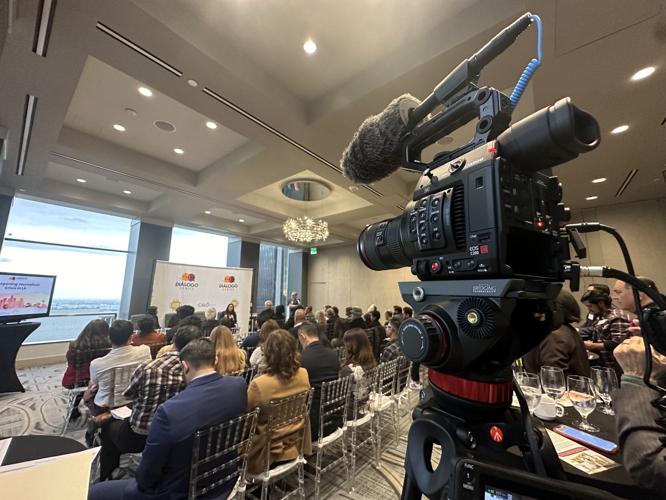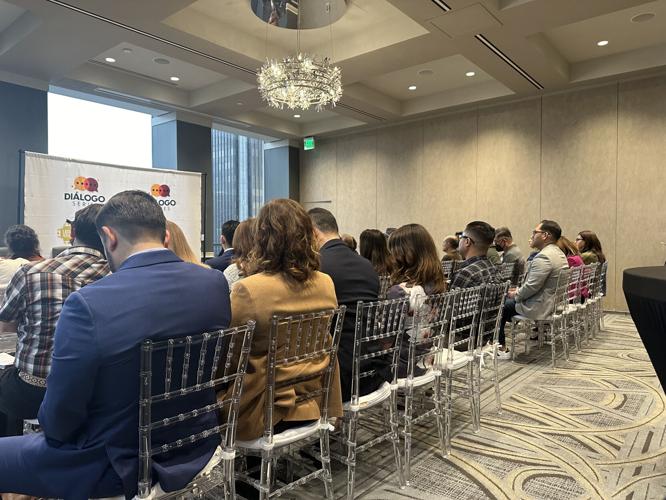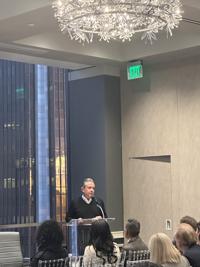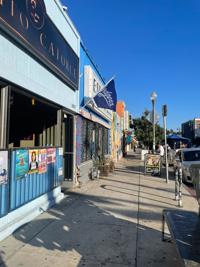
City Club LA in Downtown Los Angeles hosted LMC and CALÒ News’s Díalogo Series. Photo by Brenda Verano
CALÓ News and the Latino Media Collaborative hosted their first meeting on March 7, part of the new Diálogo Series, a regular convening space for open discussion and dialogue on the most pressing issues for Latinos and media leaders.
The first Diálogo session, which took place at the City Club LA in Downtown Los Angeles, was titled “A Deepening Journalism Crisis in L.A.” and aimed to facilitate dialogue on community-anchored L.A. journalism and the growing need for dedicated reporting in news deserts and historically neglected communities.
Approximately 60 people, including journalists, philanthropists and policymakers, were present at Thursday's event.
Since its founding in 2019, Latino Media Collaborative (LMC), the parent organization of CALÒ News, has worked to develop high-impact media and at the same time, outreach campaigns in partnership with the Latino media sector to advance an informed and highly engaged Latino community.
In his welcome, Arturo Carmona, president of LMC, pointed out that to create a more equitable media future, government, philanthropy and the private sector must work together.
“The Latino community in Los Angeles is home to the largest news deserts and continues to be ignored or underserved by our leading journalism institutions. Over the past 15 years, about one-quarter of California newspapers have shut down,” he said. “With Latinos now accounting for 40% of California's population and a virtual majority of the population in LA County and[the] city, the deepening regional crisis in journalism and its disproportionate impact on Latinos could not be more dire.”
Monica Lozano, former president of La Opinión and a member of the board of directors at Apple, gave the opening remarks. She talked about the role of local journalism in protecting democracy and providing trusted and credible information. In her remarks, she also touched on the role of the media when it comes to community empowerment and how having access to credible information allows people to engage with their local and statewide government agencies and decision-making, especially when it comes to voting.
The highlight of the Diálogo was a panel discussion on how to tackle the journalism crisis in LA, which was followed by a questions and answers session.

More than 60 people attended this month's Diálogo. Photo by Brenda Verano
The panel discussion was led by Martin Albornoz, general manager of CALÓ News and included statements by Martha Diaz Aszkenazy, publisher of the San Fernando Valley Sun, Jessica Gonzalez, Co-CEO of Free Press, Gabriel Lerner, former editor-in-chief of La Opinión and Sue Cross, former CEO of the Institutefor Nonprofit News.
The first speaker on the panel was Diaz Aszkenazy, who has been the owner and publisher of the San Fernando Valley Sun for the past 21 years. In addition, she currently serves on the boards of the California News Publishers Association and the National Notary Association. Diaz Aszkenazy shared her story about the success and trials of the San Fernando ValleySun and how the paper has managed to survive throughout the years.
“It takes funding to do that,” Diaz Aszkenazy said. “Community papers and publishers are business owners and we know how important this business is and how important it is to continue to cover the communities we serve.”
She said the San Fernando Valley Sun coverage is diverse. “We cover the good, the bad and the ugly, week end and week out,“ she said, which many times can result in backlash or being called out on social media, like she has been many times before. When asked about the future of journalism in Latino communities, Diaz Aszkenazy said good journalism can pave the way to an impactful future for underrepresented people.
“I’m positive about the future. I want to keep fighting and I know that there are also like-minded people who want to help us get this done. Journalism is important to our communities, to our democracies and without it, it will be a very scary place,” she said.
Jessica Gonzalez, Co-CEO of Free Press, was also one of the panelists at Thursday’s event. As a young Chicana, Gonzalez dreamed of being a journalist but noticed the need to move policy forward in communities of color. She is now an attorney and racial justice advocate, who also advances Free Press’ mission of building media and technology that serve truth and justice. She has also testified before the U.S. Congress on multiple occasions on issues including net neutrality, media-ownership diversity and affordable internet access.
“What we know is that mainstream media has not always served communities of color well, that is why we have built these ethnic media organizations,“ she said. Gonzalez also touched on the importance of funding local news and “structural policy change,” which will help invest government and public dollars in public journalism. “We understand local news and civic information as a public good that deserves public and government support,“ she said.

Miguel Santana, president of the California Community Foundation. Photo by Brenda Verano
The special guest of the evening was Miguel Santana, president of the California Community Foundation (CCF), a philanthropic organization that ranks among the top 100 foundations in the nation by asset size and total giving. CCF funds immigration, education, housing and health issues in L.A.
As part of his closing statement of the event, Santana expressed the fact that there should be more money available to local media from philanthropic sources. He also called for community foundations to play a role in supporting and expanding local journalism.
“Today was more than about local media; it was about conserving our democracy,” he said. “For philanthropy, we should all be concerned that there's a deliberate effort to undermine our democracy and our antidote to stop that is by supporting local coverage of the issue in the prospective communities.”
The next Diálogo Series event will be held in May in Southeast L.A., where a new initiative will officially launch.
In partnership with the SELA Collaborative, a network of organizations working together to strengthen and increase civic engagement in the communities of Bell, Bell Gardens, Florence-Firestone, Huntington Park, Lynwood, Maywood, South Gate, and others, LMC hopes to build a SELA Journalism Initiative focused on providing dedicated reporting staff and capacity to develop daily news content for the region.
For additional information on the Diálogo Series and if you would like to donate to LMC's effort to advance an informed and highly engaged Latino community through a thriving Latino media sector, visit latinomedia.org/2024-dialogo-series















(0) comments
Welcome to the discussion.
Log In
Keep it Clean. Please avoid obscene, vulgar, lewd, racist or sexually-oriented language.
PLEASE TURN OFF YOUR CAPS LOCK.
Don't Threaten. Threats of harming another person will not be tolerated.
Be Truthful. Don't knowingly lie about anyone or anything.
Be Nice. No racism, sexism or any sort of -ism that is degrading to another person.
Be Proactive. Use the 'Report' link on each comment to let us know of abusive posts.
Share with Us. We'd love to hear eyewitness accounts, the history behind an article.